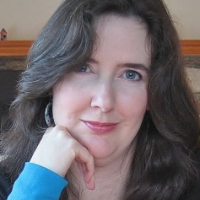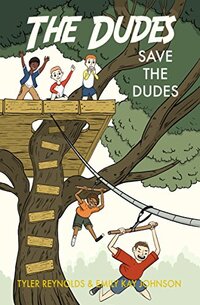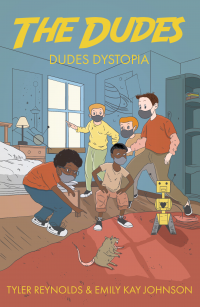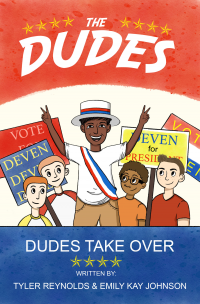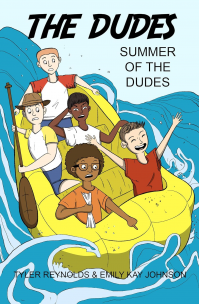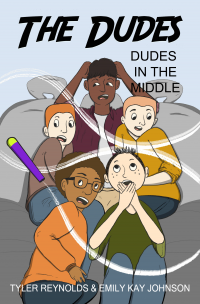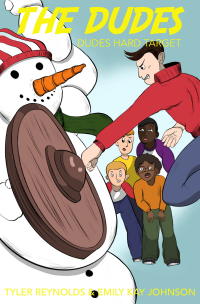What was your early life like and where did you grow up?
I grew up in a suburb of Birmingham, AL. I loved all kinds of humor and adventure in books and TV. Both my parents worked, so my brother and I had free time to get into mischief after school before they came home. I didn’t have friends in walking distance, so I used my imagination a lot and read funny adventures like Henry Huggins. My brother happened to have several friends who lived close by, and I watched them try various schemes and get into crazy scrapes. It felt very safe where we lived in the suburbs, but also very boring. I had imaginary friends and imaginary adventures too. I climbed trees and my dad built us a treehouse. I would explore the local woods and sneak onto the golf course to catch crawdads in their creek. Gender roles were more strict there than they are where I live now in the West. I liked “boy stuff” and “girl stuff”.
Asian and South Asian families as well as Europeans and Latin Americans had family members who worked or studied at the University of Alabama Birmingham medical school. Iranian professionals were settling the area after leaving a conservative crackdown in Iran. We didn’t celebrate diversity back then, but I think I benefited from being surrounded in school by many different types of faces and names.
At the same time, my school was “desegregated” which meant that a small contingent of black kids (who lived across town) was bused to our school. I never witnessed them being treated badly, but there was never more than one in any of my classes. Which, I’m sure, was harder for them than I knew. Only black kids rode buses. White parents were averse to busing because of the association. So all the local kids aside from African Americans had to form carpools driven by those mothers who were stay-at-home. (Or, in my case, my Dad.)
At what age did you read your first book?
My grandmother was a teacher and gave me leveled readers to entertain me when I was 6. I read about Dick and Jane and Spot. But I always imagined more was going on behind the scenes in their pretty suburb. I always bought books at the school book fair. I remember being entranced by Misty of Chincoteague and The Black Stallion. My mom had a collection of what used to be considered childhood classics:, Treasure Island, Hans Brinker and the Silver Skates, Huckleberry Finn, Heidi, Gulliver’s Travels, Robin Hood, Robinson Crusoe. These were really adult books and written in very complex language. They are proof that the crossover of YA/childrens’ books to the adult market happened in reverse first. I devoured anything with adventure. The Chronicles of Narnia set me on the road to fantasy. My local library had a great collection of science fiction by Andre Norton--some of which was specifically for kids. I read it all.
Why do you think that it is so important to introduce literature and reading to children at a young age?
Reading isn’t just about improving your test scores and facility with language. Stories feed the imagination, giving you a place to turn to in times of emotional distress. They are a place to work out what you believe and what is important. I never, and my kids never responded to the kind of literature in which “kids with a problem work things out”. I’m very much about reading as living an adventure in your mind. It can be entertaining, funny, exciting, and end happily. Books don’t have to be serious or have a moral to teach you something.
Your thoughts on conventional vs. self-publishing? What route did you choose and why?
I started out with the traditional publishing route, which was all that existed in the 1990’s. I did everything right. I honed my craft, sold short stories to childrens’ magazines, and networked at writers’ conventions and organizations. I had confidence in my work. But the outlook for every being traditionally published grew progressively worse. The magazine market dried up. Publishing houses shuffled employees and stopped reading unsolicited manuscripts. At the same time, agents were saying I wasn’t worth their time unless I was already famous or at least had a large social media platform.
I decided to go the self-publishing route because I knew that I had never chosen a book based on the author’s social media presence. At the time, children’s writers were making money by giving talks in schools and selling to parents who heard about them that way. Again, this seemed round-about. I wasn’t a salesperson. I was a writer. Amazon’s online presence would allow me to simply sell books using the book itself and advertisements pointing to it.
Who were some of your heroes as a kid and how have you incorporated them into your writing (if you have)?
My heroes have always been characters. I wanted to be Robin Hood and Captain Picard and Indiana Jones. When I write child characters, these are the heroes they are emulating. The Dudes are adventurous and swashbuckling in their own suburban neighborhood.
Take us back to when you were writing your first book. What inspired the story and how did you go about picking a suitable title and book cover?
The Dudes were inspired by my kids and their friends. Our basement was the place where everybody came to hang out, which was both a blessing and a curse for me as a parent. As I observed these boys, I was drawn back to my own middle grade years and the antics of my brother and his friends. Between the two influences, the Dudes were born.
As for the cover, I knew it was important to have a good, professional cover. I also wanted my publishing business to help other artists make a living. So I determined to pay union scale, and I looked for an artist on HireanIllustrator.com Jacquelyn B. Moore was just out of art school, but her portfolio stood out to me immediately. She had drawn a series of scenes of a diverse group of preteens. The kids were obviously getting into some kind of mischief and their faces showed their hilarious reactions. I knew this was the perfect artist to portray the Dudes, and she’s done the cover art on all six books so far!
What were some of your goals with the book "Dudes Hard Target"?
School life is always changing. My kids’ district recently spent a lot of money on security upgrades, which sparked some ideas about how the Dudes would deal with these changes. There is a lot of fear and craziness around school safety issues in our age of school shootings. If parents and PTA and school administrators feel anxiety, how must the students feel? I think humor can break the tension and give kids a sense of control over how they approach scary things. So, I guess, as always, my goal was to find the fun!
What is the main message that you wish to spread with "Dudes in the Middle"?
That peer-pressure is all mind games. I mean, I’m telling it in a funny way, with the Dudes creating a fake trendsetter and deciding to make the student body love bluegrass music. But people follow fads in order to feel like they belong, and there is usually someone who benefits from your fear of not belonging, whether it’s a celebrity or a fashion company or the popular clique. But what if you see it as all stupid and meaningless? Then you are free to like something weird or hang out with who you want or just feel “normal” for being who you are.
What sort of direction will you take with the next book in The Dudes Adventure Chronicles series?
The biggest thing that has happened for kids lately is, of course, the Covid-19 pandemic. The Dudes will seize this as an opportunity to act out all their favorite dystopian fantasies.
To be fair, it is the adults, not the kids, who made the pandemic dystopian. But the Dudes are never ones to sit back and watch. They will tackle online school, pandemic bubbles, and social distancing in their usual action-packed, comedic style.
When you start writing something new, what are some things you outline first?
I start with action scenes and jokes. It takes a while for the plot of a book to come together for me. I start by brainstorming the general idea I want to cover in the book. For instance, for Summer of the Dudes, I knew I wanted to talk about emergency preparedness. Disasters are fascinating for kids. So I brainstormed funny scenes like Nate creating an earthquake simulator and the guys locking Deven’s dad in a safe room.
The more I jot down, the more ideas come. Eventually, the Dudes create their own emergency with a robot invasion during the Arts Festival. Stringing the laughs together with cause and effect comes later. I never really have an outline for the Dudes--just a list of chapters.
Which one do you prefer: writing a series or standalone novel? Why?
I prefer series because I prefer stories and characters that go on (and on). I like TV series better than standalone movies too. With several books you have a chance to see characters grow and change, and you can tell a more complex story with the plot too.
Which of your books was the most memorable to write and why?
I’d have to say that Dudes in the Middle is close to my heart. In the book, the Dudes invent an imaginary eighth-grader to help them sway the school’s fads and trends. I found my thoughts frequently going back to a similar time in my tween-hood when my girlfriends and I invented a fake love interest to impress an out-of-state friend. At camping trips and sleepovers, we would make up scenarios and write the friend letters describing them. At one point, “Stewart” was dating two of us at the same time and enlisting another friend for support in “his” deception. The Dudes’ “Stewart” is much more of a team player, (although I think Teresa sees him as a romantic interest).
Besides children's books, have you ever written anything for adults? If not, do you ever plan on doing so?
You never know where your imagination will take you, but I doubt I will ever write for adults. I really appreciate the hopefulness with which children’s literature is imbued. Characters have to be real. Situations can even be gritty. But you can’t give up on a hopeful ending because the young people reading have their whole life ahead of them in which things can change for the better. And young people can drive that change.
What are you currently working on? May we know when we can expect a new book?
I’m hoping to debut a new fantasy series next year. It’s about a girl hero and a wizard’s apprentice. And, of course, I’ll write the next installment of the Dudes series. It should come out in 2023.
How were you introduced to AllAuthor? Has the website reached your expectations and is there anything we can do to improve your experience?
I started with a discount deal offered through my membership with Alliance of Independent Authors and Illustrators. I tried the initial 6 months and was sold on the value of the Pro plan. AllAuthor got me up and running on Twitter, provided a lot of free mock-ups and materials, and even inspired me to be more strategic about all my social media. AllAuthor is smart about Twitter so I don’t have to be. I have very little money to spare for promotion, but this is an expense I don’t question.

